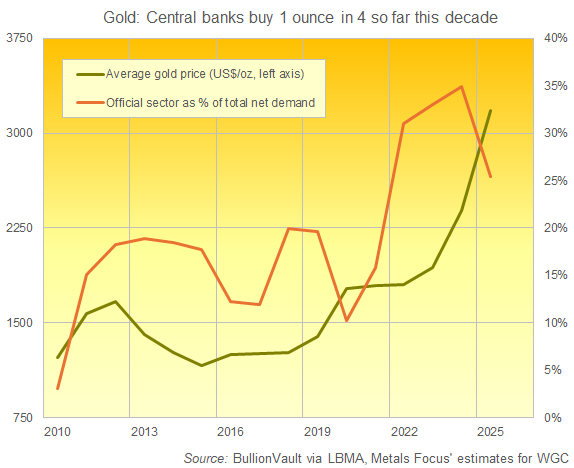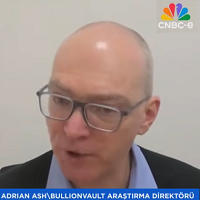Moscow Sells Gold, EU Targets Frozen Russian Assets to Keep Funding War
GOLD and SILVER PRICES rose near 2-week highs in London trade on Wednesday as the Kremlin denied any progress in US-led peace talks with Ukraine, while the European Union pushed to use frozen Russian central bank assets to fund Kyiv's military and economic spending.
Since the Kremlin's invasion of Ukraine began in February 2022, Russia's Finance Ministry has now sold over half the gold in its National Wealth Fund "to cover budget shortfalls", the Moscow Times reported last week, cutting the NWF's holdings from 405 tonnes to 232 tonnes by the start of this month.
That may have raised the equivalent of $17 billion on BullionVault analysis.
The Central Bank of Russia meanwhile used October's record-high gold price spike to sell 3.1 tonnes of gold worth around $400 million, official data show, making its 10th trade of that size since New Year 2023 and shrinking the CBR's reported holdings − gold holdings which grew sharply during the Crimea sanctions applied by the US and Europe after Russia's first invasion of Ukraine in 2014 − some 0.3% by weight so far this year to 2,329 tonnes.
The value of Moscow's central bank gold in 2025, in contrast, has risen by 20.8% in Russian Rubles and by 53.2% in US Dollars.
Spurred by mistrust in the Dollar and the freezing of bonds and other financial assets owned by Russia, central banks and similar institutions have hiked their gold investment demand over the first half of this decade, accounting for 25.9% of all net gold demand globally according to estimates from specialist analysts Metals Focus for the mining industry's World Gold Council.
That contrasts with 15.5% across the 2010s.

"We need to support Ukraine to defend itself," European Commission President Ursula von der Leyen told the European Parliament today, urging member states to back the "reparations" proposal she made last week to plug Kyiv's €135 billion budget deficit for 2026 and 2027, more than 3/5ths of it earmarked for military spending.
Raising twice the sum already provided by European nations since Russia's invasion began nearly 4 years ago, the plan would tap €185bn of Russian-owned investments kept at Euroclear − the central securities depository in Brussels − either to finance Kyiv directly, or as collateral for an EU member state loan, itself funded by new bond-market debt.
"Central banks from both developed and emerging markets are planning to add to their gold holdings, but the rise is driven by politics more than price," says a new report from the "public investor working group" brought together by London-based think tank OMFIF.
"As one reserve manager put it, holding gold signals independence."
Gold priced in Dollars today touched $4173 per Troy ounce in London − the world's central trading and storage hub for precious metals − while silver prices rose towards $53.
US President Donald Trump "understands" that the Ukraine war "is a complex issue that requires complex solutions," said his Russian counterpart Vladimir Putin on a visit to Kremlin ally Belarus on Wednesday.
"Time and attention are needed for the dialogue process to continue," said Russian Deputy Foreign Minister Sergey Ryabkov, adding that "We are committed to the results of Anchorage" − a 3-hour meeting between Trump and Putin held in Alaska in August, details of which have yet to become public.
In total, the liquid assets held in Russia's NWF − including gold bullion and Chinese Yuan − have dropped some 55% since the start of 2022 to $51.6bn, says the Moscow Times.
"The Central Bank executing equivalent operations on the domestic market, not only in Yuan but also in gold, is justified considering that [domestic] household demand for gold as a means of saving has increased in recent years," claims Deputy Finance Minister Vladimir Kolychev.
"Turnover on the domestic gold market has increased, and liquidity on the domestic gold market has risen."
While Moscow's MOEX stock-market index fell 0.7% on Wednesday, most developing and rich-economy bourses rose for the 5th session running, matching the longest stretch of gains on the MSCI World Index since end-September.
US borrowing costs rose from Tuesday's 4-week low, edging above 4.0% per annum on 10-year Treasury bond yields.
UK Gilts prices rose, in contrast, pushing the ruling Labour Party government's 10-year borrowing costs down to what was a new 2025 low this time last month at 4.44% per annum as finance minister Rachel Reeves announced a series of tax and spending hikes in her autumn Budget Statement.
The UK gold price in Pounds per ounce fell £30 from a near 2-week high of £3177, hit this morning, while the Euro price of gold held close to €3600 − also a new all-time high when first reached 6 weeks ago, shortly after the Israel and Hamas agreed a peace deal in Gaza.
"We all know it was only President Trump that could have ended the war" in Gaza, said Jordan's Foreign Minister and Deputy Prime Minister Ayman Safadi to German news-site DW at the Berlin Foreign Policy Forum yesterday.
"[But] the ceasefire...is being broken by Israel, unfortunately. We have to stabilize that as a priority."
Officials from Turkey, Qatar and Egypt met today in Cairo to discuss the next stage of the peace plan, even as Hamas and Israel both accuse each other of repeated ceasefire violations.
"Putin is now at a point where he has to increase taxes, which says a lot about the situation in Russia," Western military alliance NATO's Secretary General Mark Rutte tells Spain's El Pais in an interview today.
"The war against Ukraine is really impacting the lives of Russians.”
The Russian Parliament today approved raising VAT sales tax from 20% to 22%, a move the Kremlin reportedly told Russian media to blame on Ukraine's Western allies, because they are "not interested in a peaceful settlement."
With global crude oil prices today falling to 1-month lows, new US sanctions on major Russian producer Rosneft and Lukoil "are having a softer financial impact on Indian refiners than initially feared, with wider discounts on Russian crude nearly offsetting the expected drop in volumes," says the Times of India.









 Email us
Email us